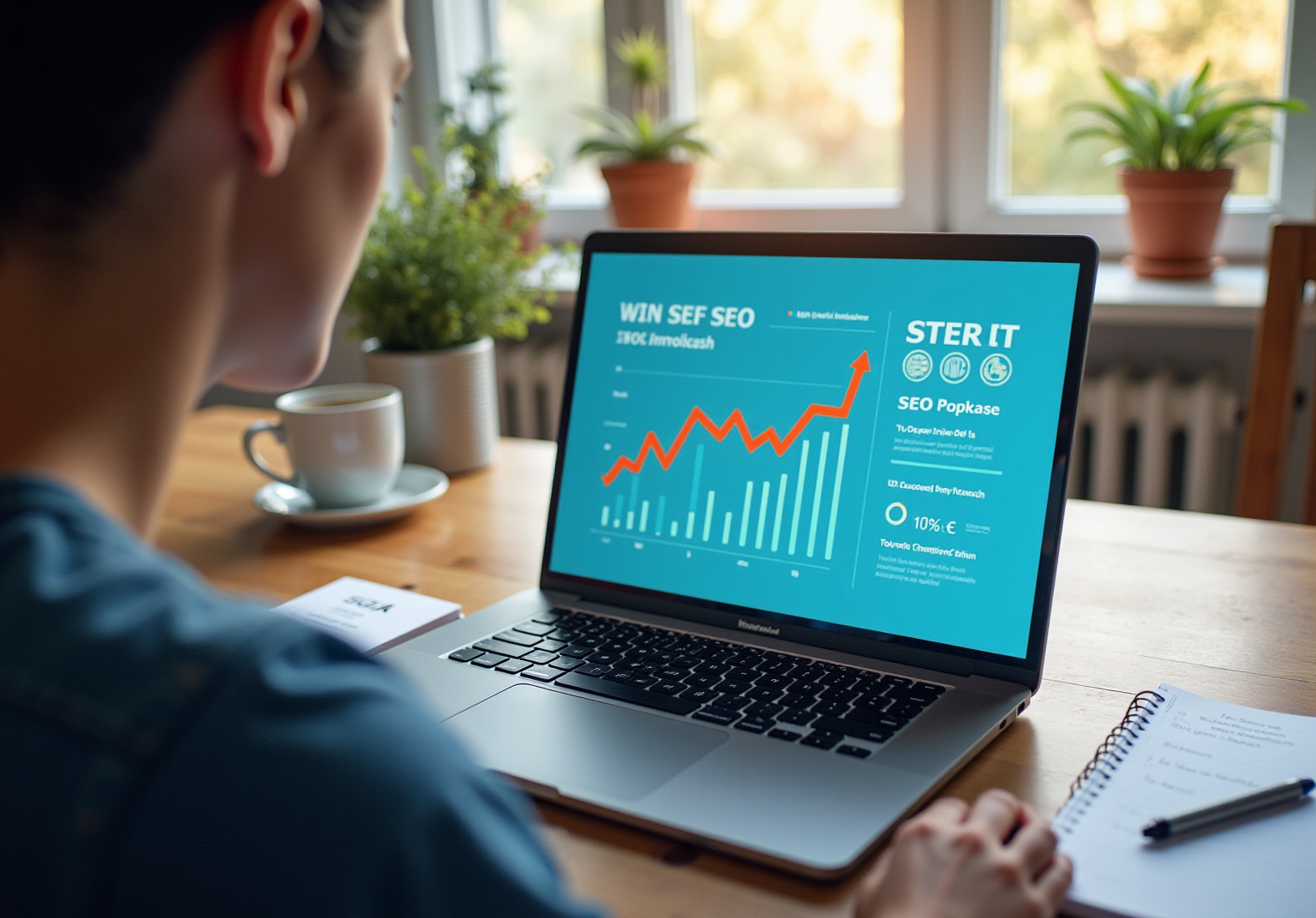
Overview
SEO conversion is indispensable for direct-to-consumer (DTC) brands, as it not only drives organic traffic but also enhances customer engagement. This, in turn, leads to increased sales and a diminished reliance on paid advertising.
Effective SEO strategies are pivotal; they not only improve visibility and profitability but also cultivate long-term customer relationships.
Case studies illustrate significant sales increases for brands that prioritize SEO optimization and user experience, underscoring the necessity for brands to adopt robust SEO practices to thrive in a competitive market.
Introduction
The digital landscape is undergoing rapid transformation, and for direct-to-consumer (DTC) brands, mastering SEO conversion stands as a pivotal element of success. This essential process not only drives organic traffic but also converts visitors into loyal customers, thereby directly influencing revenue without the escalating burden of advertising costs.
As competition intensifies and consumer behavior evolves, DTC brands must strategically harness the power of SEO conversion to enhance visibility and cultivate long-term relationships.
Delving into this crucial strategy unveils the key characteristics and benefits that can elevate brands to new heights in an increasingly crowded marketplace.
Define SEO Conversion and Its Importance for DTC Brands
SEO transformation represents the pivotal process through which a website visitor, arriving via organic search results, completes a desired action that aligns with a company's objectives—whether it be making a purchase, subscribing to a newsletter, or filling out a contact form. For direct-to-consumer (DTC) companies, optimizing for SEO results is not merely beneficial; it is essential, as it directly influences revenue and enhances client interaction without incurring additional advertising expenses. By concentrating on SEO optimization, brands can significantly amplify their visibility and attract high-intent traffic, ultimately driving sales. This strategy not only reduces reliance on paid advertising but also nurtures long-term client relationships, making SEO conversion a fundamental component of a successful digital marketing strategy.
Statistics reveal that nearly 69.57% of online shopping carts are abandoned before checkout, underscoring the critical need for effective SEO conversion strategies to capture and convert potential customers. Furthermore, businesses can earn $42 for every $1 spent on email marketing, highlighting the value of integrating SEO insights into direct marketing efforts. Case studies illustrate that companies prioritizing SEO experience substantial benefits; for instance, a DTC skincare firm that combined SEO and direct marketing strategies witnessed a remarkable increase in sales of its anti-aging serum. This not only enhances visibility but also fosters trust and engagement, ultimately leading to higher sales rates and increased revenue for DTC companies.
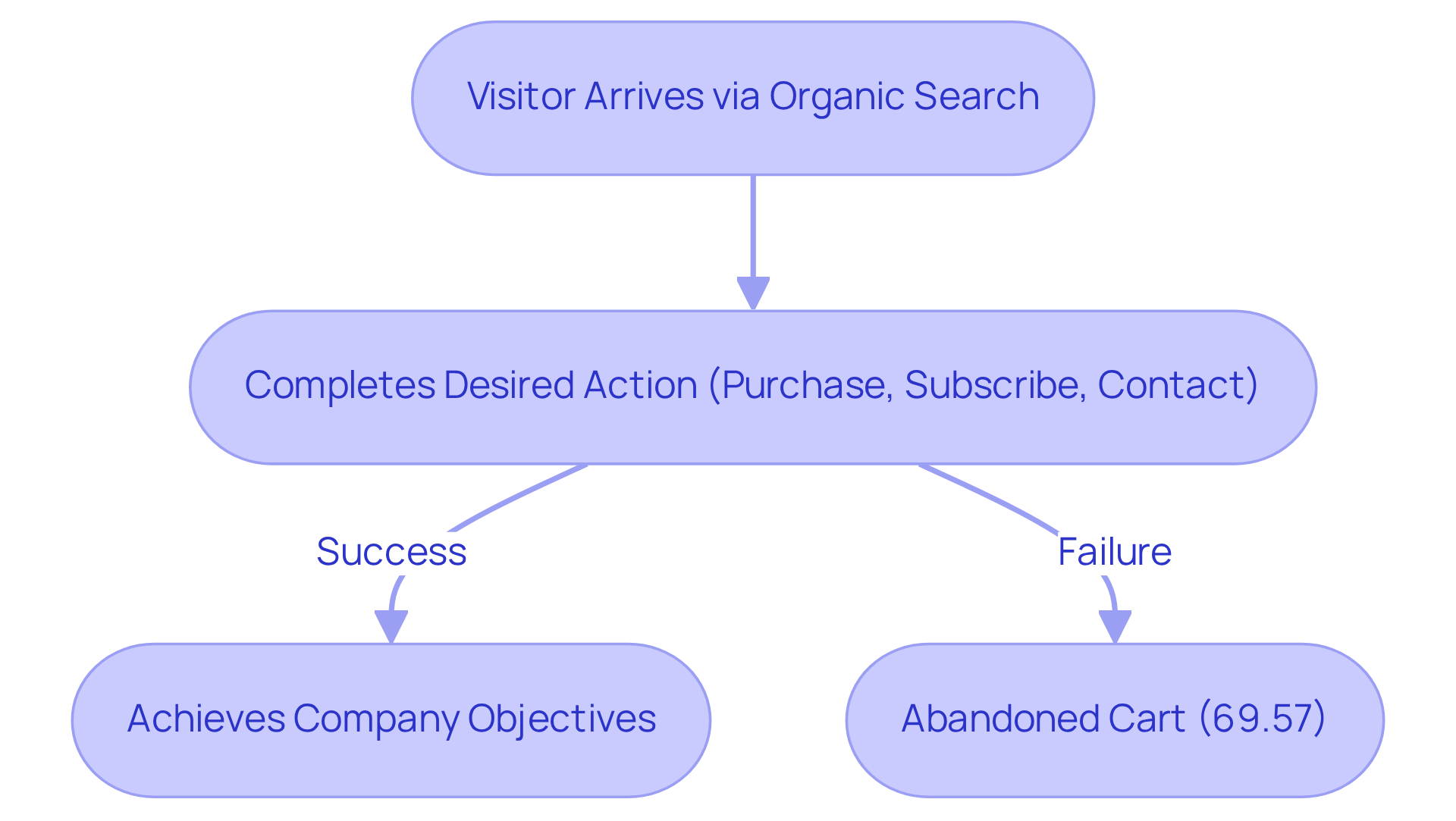
Contextualize SEO Conversion in Digital Marketing for DTC Brands
In the realm of digital marketing, attracting organic traffic to DTC companies hinges on effective SEO conversion. Unlike traditional advertising methods that depend on paid media, SEO emphasizes the to achieve higher rankings in search engine results. This organic approach not only reduces client acquisition costs but also fosters a long-term reputation. As DTC companies face increasing competition and rising advertising expenses, implementing efficient SEO strategies is essential for maintaining visibility and achieving SEO conversion while attracting individuals actively seeking their products.
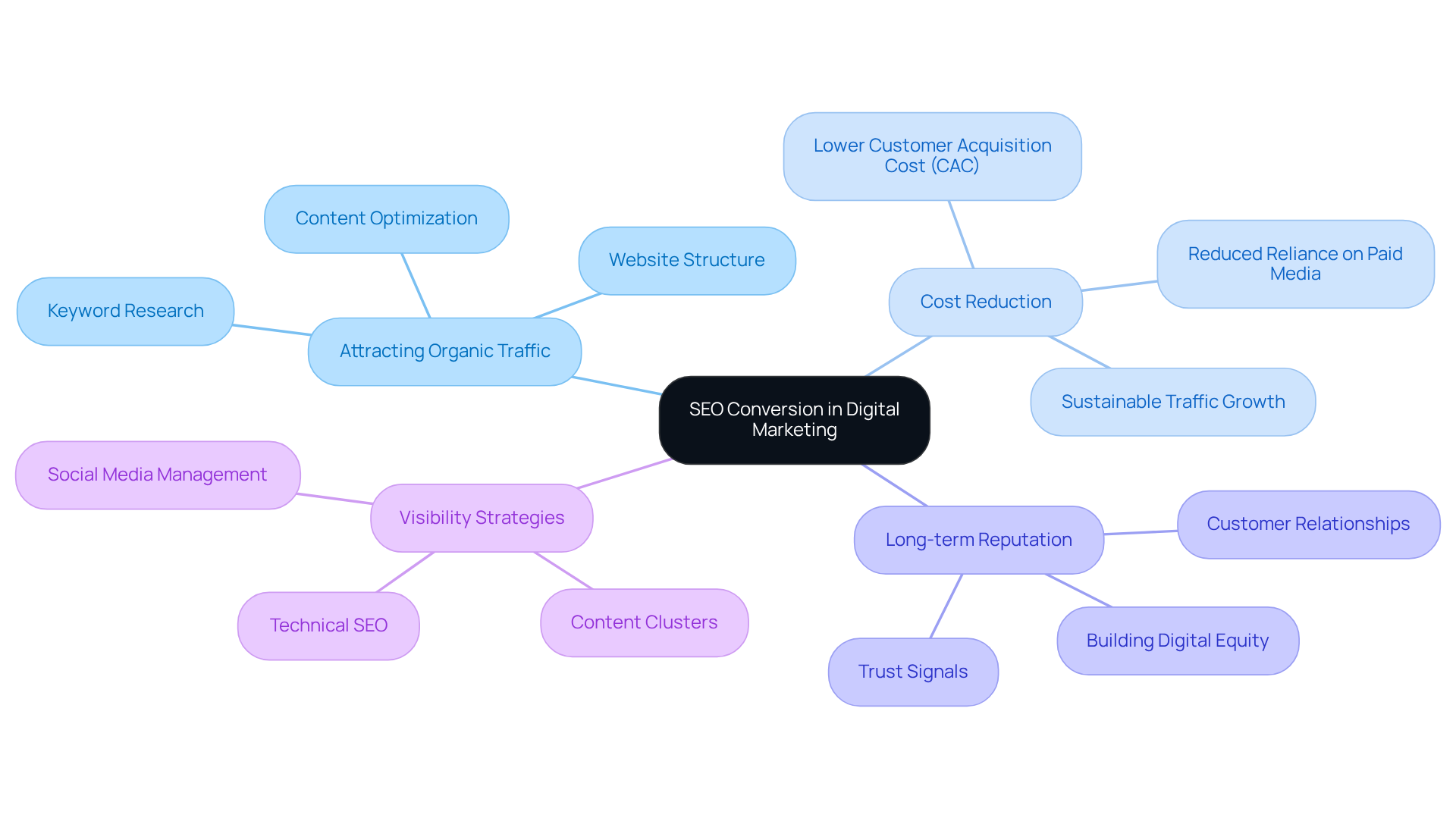
Examine Key Characteristics and Components of SEO Conversion
The effectiveness of SEO hinges on key characteristics such as user intent, website usability, and content relevance. Understanding user intent is essential; brands must align their content with the specific queries and needs of potential customers. Website usability includes critical factors like page load speed, mobile adaptability, and user-friendly navigation, all of which significantly enhance user experience and boost engagement. Notably, a one-second delay in page loading time can lead to a 20% decline in mobile sales rates, underscoring the importance of speed and efficiency.
Furthermore, high-quality, relevant content that addresses client pain points and offers solutions is vital for engaging visitors and guiding them toward successful outcomes. Research indicates that 88% of online shoppers are unlikely to return to a site after experiencing poor usability, highlighting the crucial role of user experience in client retention. By prioritizing these elements, DTC companies can markedly improve their SEO conversion rates, ultimately resulting in increased profitability and enhanced customer loyalty.
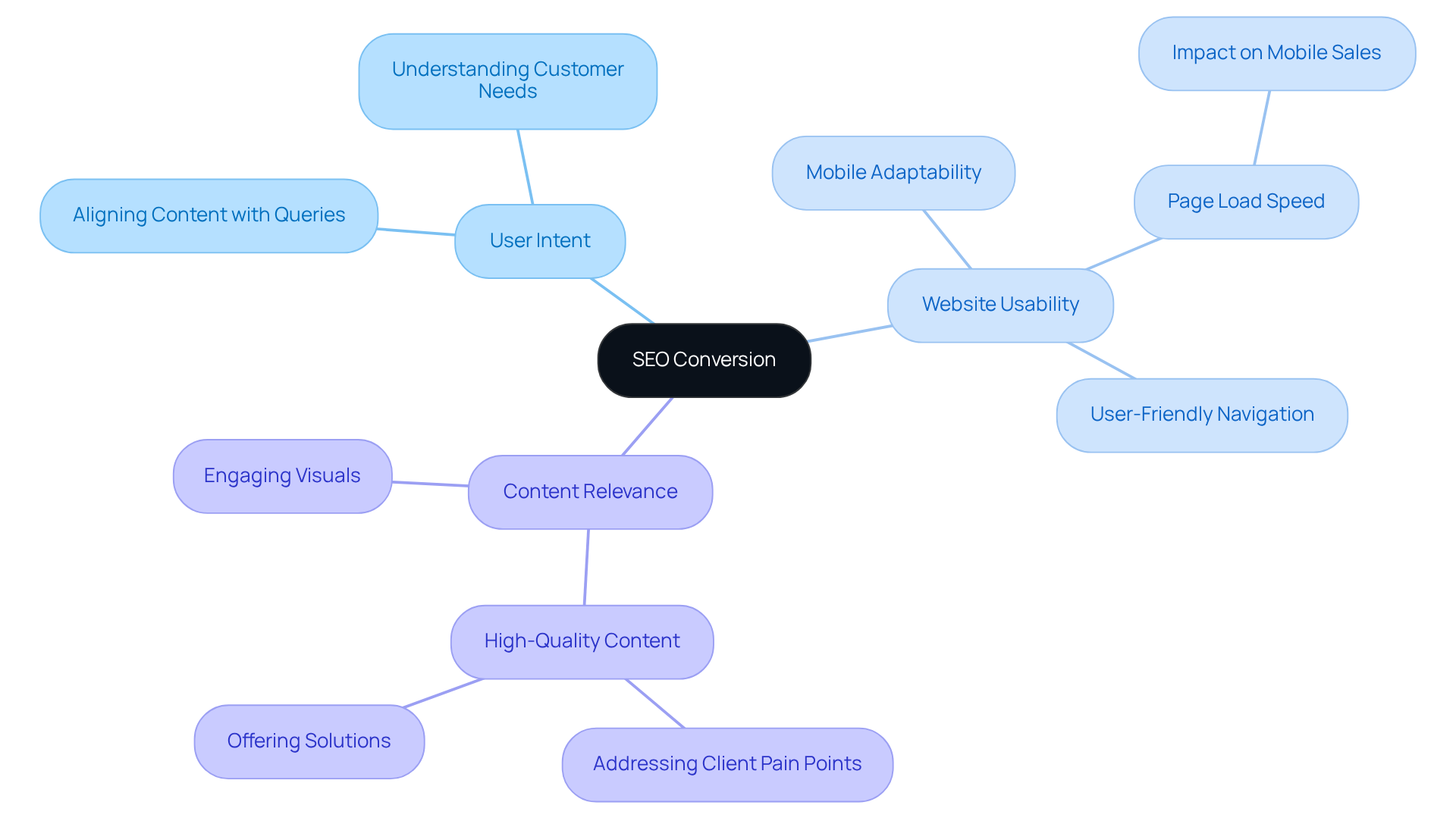
Discuss Implications and Benefits of SEO Conversion for DTC Brands
The effects of successful SEO optimization for direct-to-consumer companies are profound. By enhancing their sites for SEO results, companies can achieve a lasting increase in traffic without the escalating costs associated with paid promotion. This not only boosts profitability but also cultivates a loyal customer base, as consumers increasingly trust brands that rank prominently in search results.
For instance, a $30M clothing label that partnered with Parah Group saw a remarkable 35% increase in sales after implementing strategic adjustments such as:
- Redesigning their homepage to highlight social proof
- Reducing unnecessary pop-ups
- Optimizing product pricing
Furthermore, improved SEO conversion rates facilitate a higher return on investment (ROI) from marketing efforts, allowing companies to convert a greater percentage of their organic traffic into paying customers.
Another notable example is Grab Green, a $15M cleaning product company, which achieved a staggering 73% increase in average order value (AOV) through targeted conversion rate optimization (CRO) strategies, including:
- Testing free shipping thresholds
- Adding bundles to encourage larger purchases
SEO traffic is crucial for profitable growth in e-commerce, as it can reduce customer acquisition costs and enhance lifetime value. Direct-to-consumer (DTC) companies that effectively leverage SEO strategies can realize an average ROI of 147% or more, underscoring the financial advantages of prioritizing SEO. Typically, SEO strategies begin to yield visible results within 3 to 6 months, positioning it as a long-term investment.
Additionally, focusing on user experience is vital, as it drives engagement signals that bolster SEO performance. Ultimately, prioritizing SEO conversion is a strategic decision that can significantly , ensuring long-term success in a competitive marketplace.
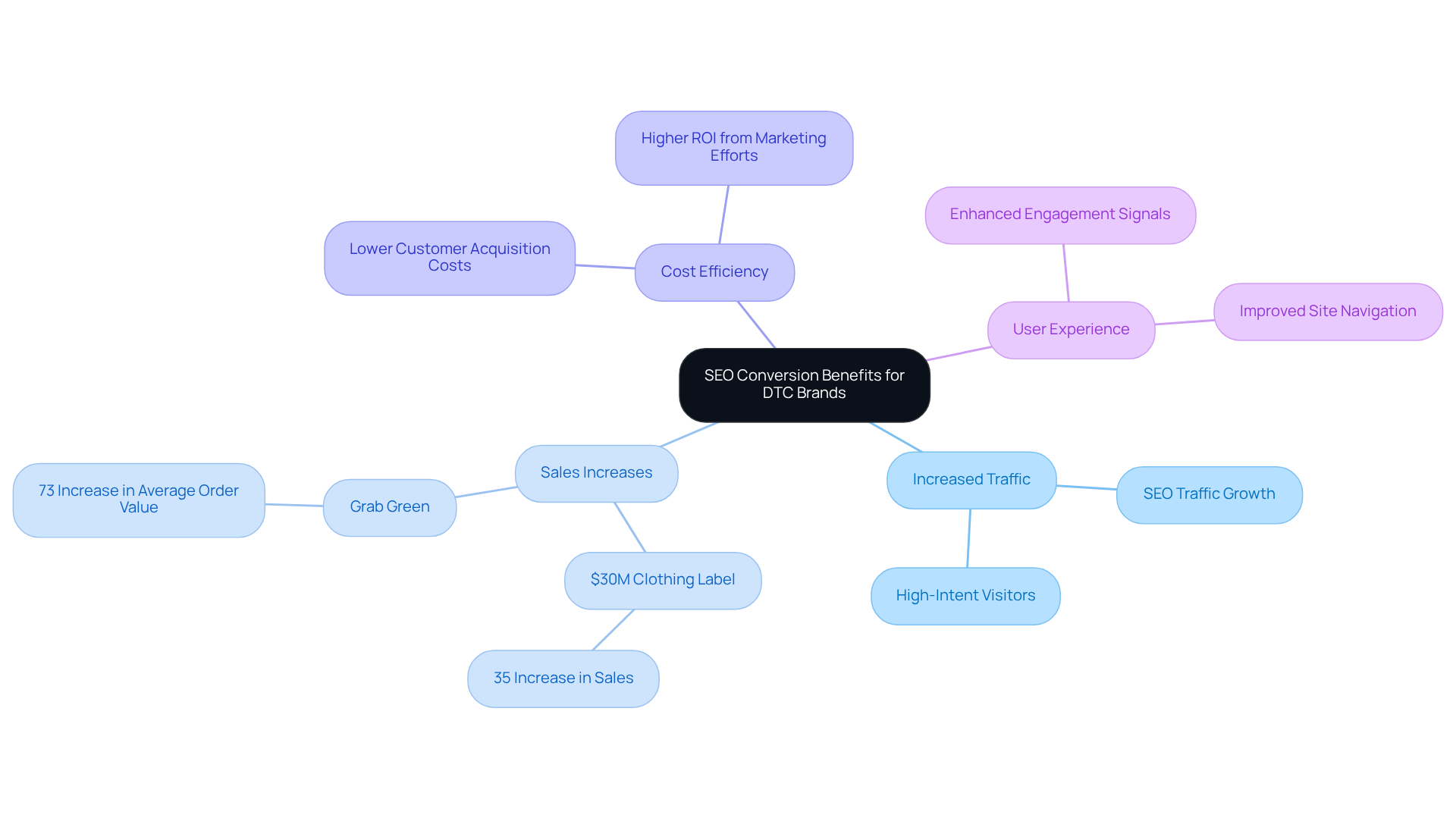
Conclusion
Optimizing SEO conversion stands as a vital strategy for direct-to-consumer (DTC) brands, fundamentally influencing their capacity to attract high-intent traffic and drive sales. By prioritizing user experience and aligning content with customer intent, DTC companies can markedly enhance their visibility without incurring extra advertising costs. This strategy not only cultivates trust and loyalty among customers but also establishes SEO conversion as a foundational element of effective digital marketing.
Key insights underscore that grasping user intent, enhancing website usability, and delivering high-quality content are essential components of successful SEO conversion. The statistics underscore the urgency for DTC brands to embrace these strategies, as they can lead to significant increases in sales and customer retention. For instance, companies that have integrated SEO with direct marketing efforts have witnessed remarkable growth, illustrating the potential of this synergy.
Ultimately, the significance of SEO conversion for DTC brands cannot be overstated. As competition escalates and advertising costs soar, prioritizing SEO strategies will not only bolster profitability but also secure long-term success in a dynamic marketplace. DTC brands are urged to invest in their SEO initiatives, acknowledging that the benefits extend well beyond immediate sales, paving the way for sustainable growth and deeper customer engagement.
Frequently Asked Questions
What is SEO conversion?
SEO conversion refers to the process through which a website visitor, arriving through organic search results, completes a desired action that aligns with a company's objectives, such as making a purchase, subscribing to a newsletter, or filling out a contact form.
Why is SEO conversion important for DTC brands?
For direct-to-consumer (DTC) brands, SEO conversion is essential as it directly influences revenue and enhances client interaction without incurring additional advertising expenses. It helps amplify visibility, attract high-intent traffic, and drive sales.
How does optimizing for SEO benefit DTC companies?
Optimizing for SEO reduces reliance on paid advertising, nurtures long-term client relationships, and is a fundamental component of a successful digital marketing strategy, ultimately leading to increased visibility and sales.
What statistics highlight the need for effective SEO conversion strategies?
Nearly 69.57% of online shopping carts are abandoned before checkout, indicating the critical need for effective SEO conversion strategies to capture and convert potential customers.
What is the financial impact of integrating SEO with email marketing?
Businesses can earn $42 for every $1 spent on email marketing, demonstrating the value of integrating SEO insights into direct marketing efforts.
Can you provide an example of a company benefiting from SEO strategies?
A DTC skincare firm that combined SEO and direct marketing strategies saw a significant increase in sales of its anti-aging serum, illustrating the benefits of this approach in enhancing visibility, trust, and engagement.
FAQs











